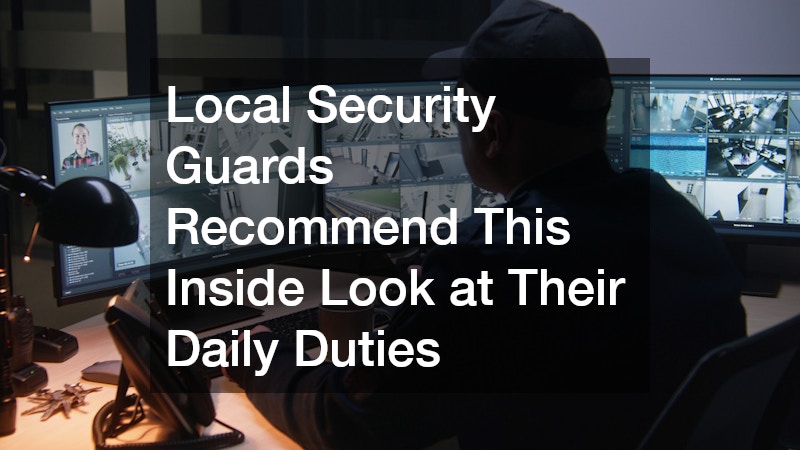
When most people think of a security guard, they picture someone standing at a door or doing routine rounds in a mall. But the reality is much more complex—and far more vital. Security guards are on the front lines of public safety, responsible for protecting people, property, and information in countless environments.
Video Source
From schools and hospitals to office buildings and construction sites, their presence offers more than peace of mind—it offers real protection.
In this article, we take you through a typical day in the life of a local security guard. With help from this behind-the-scenes video by Indeed, you’ll get a clearer picture of what these professionals actually do, what skills they need to thrive, and the challenges they face daily. Whether you're curious about the profession or looking to hire security for your business, this inside look offers a practical and human perspective.
A security guard’s duties can vary depending on where they work, but certain responsibilities are universal across the field. Patrols are a major component—whether on foot or in a vehicle, guards often make rounds to check for unlocked doors, suspicious behavior, or potential safety hazards. These patrols help deter crime and ensure that everything is functioning as it should.
Another key responsibility is monitoring surveillance systems. Cameras don’t just watch the building; someone has to watch the cameras. Guards spend time in control rooms or behind desks, keeping an eye on live feeds to catch issues in real time. From identifying a trespasser to noticing a fire alarm going off in a rarely used stairwell, attention to detail is critical.
In addition to surveillance and patrol, security guards are expected to log incidents, complete reports, and maintain detailed records. They may also be responsible for managing access control—checking badges, issuing visitor passes, or inspecting deliveries. In many cases, they are the first point of contact for employees or guests entering a facility, meaning their role overlaps with customer service more than people might expect.
Being a security guard isn’t just about presence—it’s about performance. And to perform well, certain soft and hard skills are essential.
Communication is near the top of the list. Guards often interact with a variety of people, from employees and visitors to emergency responders. The ability to remain calm, clear, and firm in conversation can de-escalate tense situations before they become dangerous.
Vigilance is another non-negotiable. A guard who zones out or becomes complacent risks missing key threats or important cues. It’s a role that requires mental alertness—even during long, quiet stretches when nothing seems to be happening.
Conflict resolution skills also come into play. Whether it’s handling a loiterer, responding to a disruptive customer, or diffusing a workplace disagreement, guards need to think on their feet and resolve issues without escalating them.
Finally, physical fitness matters. While not every guard will need to chase someone down, they should be able to stay on their feet for hours, navigate stairs or large properties, and respond quickly when needed.
Emergencies are where the training and preparedness of a security guard really shine. While they’re not law enforcement, guards are often first responders—and the first line of defense when something goes wrong.
Security personnel are typically trained in emergency protocols specific to the site they’re working at. This includes fire evacuation procedures, shelter-in-place rules, and lockdown procedures in schools or medical facilities. In many cases, guards coordinate these responses until police, firefighters, or EMTs arrive.
First aid knowledge is also crucial. Many guards are CPR certified and trained in basic lifesaving techniques. In a medical emergency, that training can make the difference between stabilizing someone and waiting helplessly for paramedics.
Perhaps most importantly, guards are trained to stay composed under pressure. Panic spreads quickly in emergencies, and having someone on-site who can direct people with calm authority helps maintain order and safety.
Despite their importance, security guards often deal with a lack of recognition—and a host of daily challenges.
One major issue is dealing with difficult or aggressive individuals. Whether it’s a trespasser who refuses to leave or an angry customer taking out frustration, guards must handle these situations professionally without putting themselves or others at unnecessary risk.
Inadequate staffing or outdated equipment is another challenge. A guard might be expected to secure a large property alone or monitor dozens of cameras with aging software—factors that increase the margin for error.
Then there’s the issue of alertness. Long shifts, late hours, or overnight work can wear on even the most committed guards. Staying vigilant during periods of low activity takes serious discipline and mental resilience.
Finally, there’s the emotional toll. Guards may encounter traumatic situations—like break-ins, accidents, or violence—and have to return the next day as if nothing happened. Support systems and proper training are key to helping them manage the psychological impact of the job.
A day in the life of a local security guard is far more involved than most people realize. It’s a role that requires focus, discipline, empathy, and quick thinking—all while standing guard over people and places we value.
By understanding the responsibilities and realities of the job, we can better appreciate the critical role security guards play in our communities. They’re not just people in uniforms—they’re trained professionals committed to creating safe environments for everyone around them.
So the next time you pass by a security guard, give a nod or a quick thank you. They’ve earned it.
